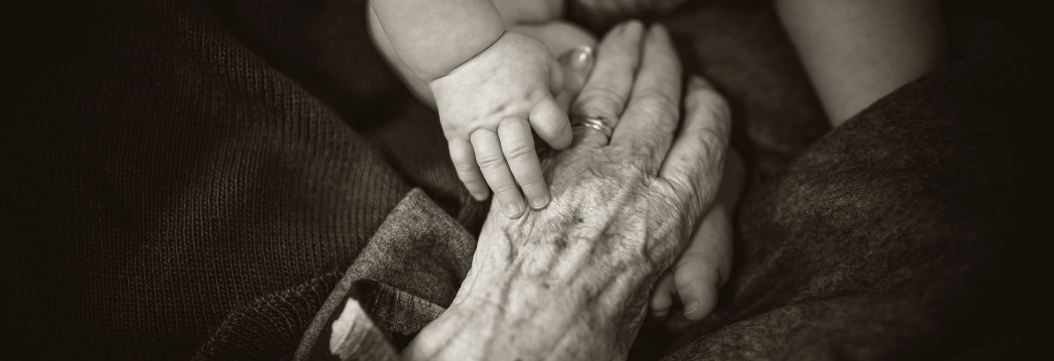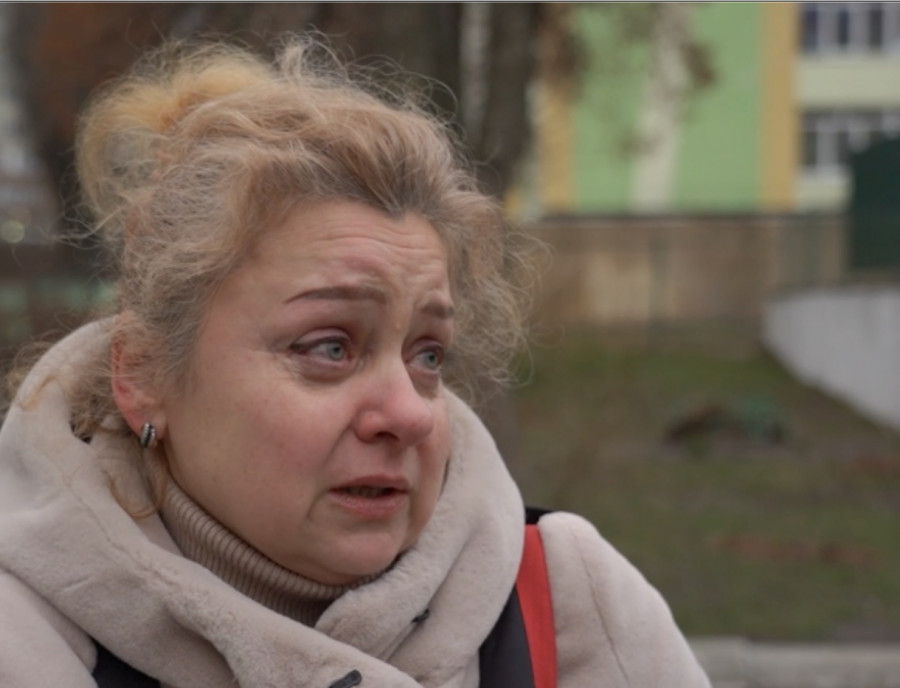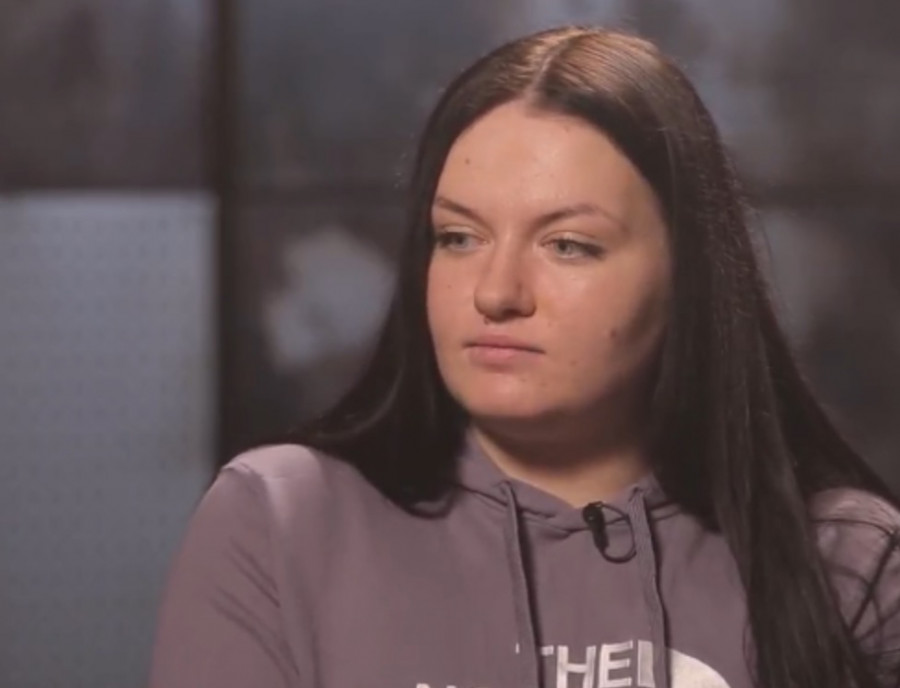TV host Hryhoriy Herman remained in the country from the beginning of the full-scale war. For some time, he and his family left the city, but then returned to their dear home again. Hryhoriy remains optimistic and is confident in Ukraine’s victory.
On 24 February, at 05:30 in the morning, when I was thrown up by explosions, the first ten minutes after, I was standing by the window in our kitchen and smoking cigarettes one by one.
And then, basically, almost immediately the feeling and understanding came to me that I woke up in a new life, in a new life that would be completely different from what was literally six or seven hours ago.
Because Iryna and I went to bed at 3 o’clock in the morning, and, you know, when we went to bed, she said, “Let’s go to bed because if it starts at 4 in the morning, you and I will be sleepy.” And it started at 05:30 in the morning, and we were sleepy indeed, but the amount of adrenaline – it at once made us perceive everything that was happening more or less adequately. And this feeling is actually still with me. As well as the understanding that this is just a new reality.
The new reality in which we must live, we must be efficient, because in this reality, every Ukrainian, wherever he or she is, must be as efficient as possible and as useful as possible for their country at this moment.
And this feeling really changed me. You know, a lot of things that were important before that have become less important or completely unimportant. A lot of things that I would not even think about have become part of my life. Some parts that I considered stable and absolute have left my life, and others that I did not even think about, have come into my life. So, yes, I have changed quite significantly. I remember absolutely clearly everything that happened. I remember absolutely clearly what we did, how we did it, and how it all happened. Well, look, everyone is in Kyiv.
We then met with Svitlana Tarabarova and her producer Lyosha, with Hryhoriy Reshetnik, well, and with many others. We exchanged phone calls. Everyone who is related to the show business and mass media, everyone had an acquaintance who wrote something either the day before or two days before. So did I too. I had an acquaintance, a good old friend of mine, who had similar information, and he wrote to me at 9 o’clock on 23 February, “My friend, the situation is really very difficult. Anything can happen, so pack up a “grab bag”. While our suitcase was in a different place, not where we live, but within a walking distance. And so that night, that evening, I was dragging that big suitcase through our quiet city district, our residential complex, where I live.
And the suitcase was knocking its wheels on the paving tiles. And I thought that I would now wake up half of my apartment complex by that noise. I thought, “Damn it, even if I wake somebody up with the sound. The main thing is that, hopefully, this suitcase turns out not to be needed.”
We packed some of the things into that suitcase, but in reality, despite the message, and I really trusted that person, so despite that, a thought still stayed in my mind, “Well, it can’t be like that. This is not for real.” Although about a month before, since the beginning of the year, I told all my acquaintances, I told everyone, “It can happen. Well, really, it can happen.” They said, “Are you serious? But how? It cannot be true.” I said, “Well, wait, it can happen and we need to get ready for it, at least mentally.” We need to understand what it can be. At least to think about where? How? What? What will you do? Where is the money? Where are the documents? What you will grab and what you will not take with you.
That is why morally, mentally, it did not become like “Oh, my God” for me, you know... One of the scenarios that I assumed actually happened, and we very, very quickly... I woke up Iryna. She was sleeping in the children’s room with the kids. I woke her up. Her father was also with us. We packed up very quickly. Well, in our world we packed for 45 minutes, and this is very, very fast, as normally we pack up… Well, we’re quite slow in that sense. But we clearly knew, I had a plan how to evacuate the family and, basically, where, because there were several options. And we started implementing one of them, but you know, yeah, it was very interesting.
I had an absolutely clear plan of what to do. I knew that in the first hours after the start of the war, there would be chaos on the roads, at the exits from Kyiv, and there would be something completely unreal in general.
But despite this, at this critical time... I understood that I would have to stay in Kyiv for a while. There were huge traffic jams, and on 24 February, as we started leaving the city, we got into a huge traffic jam at once. We immediately realized that we were running out of gasoline, so we switched to the first plan. We moved on to the plan that I had been developing from the very beginning, and so we stayed in Kyiv for the first few days. Those were very difficult days, difficult psychologically because, on the one hand, I absolutely clearly realized that Kyiv would not surrender, that they would not be able to take Kyiv.
I absolutely clearly understood that Kyiv would stand and hold on to the last on every street, and would shoot back from every house. I did not want my children to be in that house.
I did not want my wife and children to be here, amidst the war, during this battle for Kyiv. That is why we had an idea to take the family out of Kyiv immediately, and then decide what to do next. Well, so we stayed in Kyiv for several days. We heard everything that all other people heard in Kyiv on those days: the explosions, the work of the Air Defence Forces, the shooting at Obolon [a district in Kyiv], and the shooting at the International Square, we heard all of this. We were staying in a private house where my mother lives. Basically, that’s how that day passed. We almost left but then we realized that we would not get anywhere and returned to Kyiv, and remained in Kyiv for several days.
I understood perfectly well, I remember how the fighting looks like. Well, clearly I had read a lot about how the hostilities took place in Syria, in the cities. Cities that were razed to the ground. My friends who we in the war told me how everything happened in the East of Ukraine in 2014, in the period from 2014 to 2022, and so on.
In fact, we still want to leave because in a city where hostilities are going on, civilians who can’t hold weapons, who are not able to hold weapons – I mean men and women with children – they complicate things for the defending forces, rather than bring any help.
In fact, our authorities in all the cities under attack ask them, “Civilians, please leave, don’t be here, don’t stay.” Because it complicates things for the military, and defending a city with people, with civilians, is much more difficult than defending a city without people. This was also one of the important reasons why I tried to get my family out of here as soon as possible. Well, eventually, we left. Not only we left but Iryna’s father, who was with us in Kyiv that day, left too.
My parents, my mother and my stepfather, packed up and went with us. I think it was the right thing to do at that point. We did not go outside Ukraine, clearly... but we were in Western Ukraine for a long time and then returned to Kyiv, but not all of us. Because my mother and my stepfather… Well, we decided that they would better stay abroad, and so they went outside Ukraine.
The travel along the Zhytomyr highway, through Makariv and Bilohorodka, was an absolute shock. It was very difficult. It was rather demonstrative and quite striking, first of all for the children, because we were travelling in two cars. The children were in another car. I didn’t see their exact reaction, but we drove by and they also saw the damaged russists’ tanks. They saw the buildings that the russists had burned.
And Iryna explained to them that yes, this was a war, this was a terrible war, and that is why it is important to do everything for our victory, so that this does not happen anywhere else.
It was actually very therapeutic for the children to understand what war is, how dangerous it is, and how terrible it is. When we entered Kyiv... Well, what can I say, our home city, the spirit of home, I started noticing some things. Well, roughly speaking, I noticed where the tanks had passed, where the armoured personnel carriers had passed. I really felt that damaged asphalt on the streets, which previously were absolutely smooth, absolutely level and perfect. Obviously, the checkpoints were not abandoned, but the checkpoints were left without guards and territorial defence forces. Nonetheless, the checkpoints were in place. Some roadblocks in the middle of three- and four-lane highways. Gabions with soil… I noticed all this, but, you know, still nothing compares to the feeling of your hometown, your home. Your sweet home gives you power.
When you live somewhere, out of home, you have the feeling that a week or two weeks pass, and it all has to end. Well, okay, one more month – and it should all be over. And when you come home, it feels as if you are returning to this life, back to those scents you left when fleeing the war, and at the same time, in your phone everything is like before, then you understand that there is... No, dude, stop, this is just a new reality, and you have to live in it and be as efficient as possible in order to bring that moment of victory closer. In order to do everything you can.
It will not be over in two weeks. It will not be over in a month. It is a long game.
Understanding that this is not something temporary, it is not something you just need to put up with for a little while, but it is your reality and you have to get used to living in it. War is a very hard thing, and psychologically it is very hard indeed. We started to get some news about some journalists who died. And some videos from Bucha and Hostomel when Kyiv region was liberated. Absolutely terrifying moments and absolutely horrible things. When I see some pictures or learn some news about some kids who die...
Children are generally a topic very close to my heart. Basically, I take everything related to children really very close to my heart. Of course, it was... When Mariupol happened... It was very difficult indeed. For me, a person who believes in victory, it was extremely difficult to accept the news that we have to surrender Mariupol because...
Although rationally I did understand everything, and I reasonably assessed everything, that this was how it should be. I realized that we could not free them, they could not be freed in any way. Even the fact that our helicopters and even our airplanes flew there was a miracle, an amazing miracle of human heroism and a miracle of some divine labour.
I realized it, but still, I mentally prepared myself for it, thinking that it would happen sooner or later. But still, when it happened, it was all very hard. When a missile hit Syretska TV tower and people who were just passing by were killed... Well, and generally speaking, basically, it [the tower] is so dear to every Kyivan, and I used to work there some long time ago, when I was still working at the radio station, many times. And we were there quite recently. We did some filming there last year or the year before, we also filmed there. To cut it short, this is too much.
This war brings a lot of suffering that affects all Ukrainians. First, there is always room for hope, and second, we will definitely win. By all means. It is not only that we have no other way out. History leads us to the fact that our victory will be inevitable.
When quoting a story, a reference to the source – the Museum of Civilian Voices of the Rinat Akhmetov Foundation – is mandatory, as follows:
The Museum of Civilian Voices of the Rinat Akhmetov Foundation https://civilvoicesmuseum.org/






